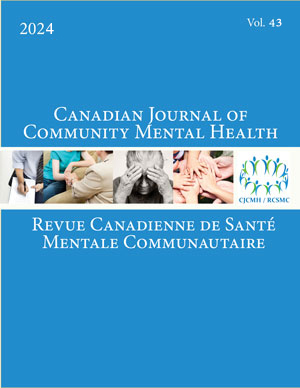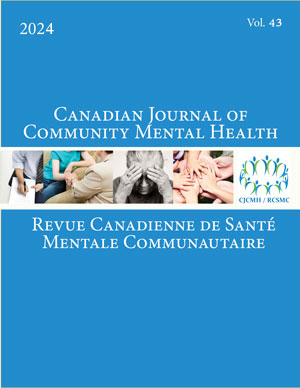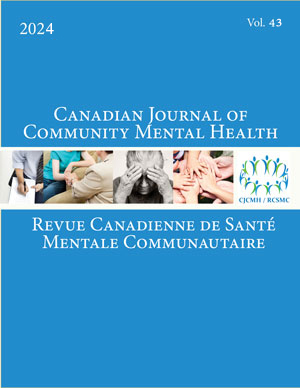Volume 41 • Number 2 • April 2022
Articles
OPEN ACCESS
This article describes the evaluation of the A.S.K. Gatekeeper Training Program which focuses on improving post-secondary participants’ ability to identify, reach out to, and support those experiencing mental health issues. Students at one Canadian college provided data at registration, prior to and following the intervention. Data from 105 matched surveys showed that prior to training participants held positive attitudes about those experiencing mental health issues but were uncertain of their abilities to assist. There was an improvement in their self-perceived confidence and skills following training. Further evaluation is needed to determine its effectiveness with other campus stakeholders, including those experiencing mental health issues.
OPEN ACCESS
This study compares the coverage of different mental illnesses in the Canadian news media over a 3-month sample period. Articles were coded for tone and content characteristics, and variations across mental illness categories were assessed with frequency counts and chi-squared tests. Articles about common mental disorders (depression/anxiety) showed more positive elements than those about severe mental illness (bipolar/schizophrenia). Many articles also focused on PTSD, with mixed coverage. Future educational efforts with journalists should particularly focus on improving coverage of more severe mental illnesses such as schizophrenia, bipolar disorder, and PTSD.
OPEN ACCESS
An ongoing consideration of community mental health services is how to optimize outreach to best support a wellness approach. Public libraries provide a potential site for mental health services due to use by a diverse range of patrons. The purpose of this study was to explore a mental health wellness hub situated in a core urban library. Following a mixed methods approach, the study explores: (1) the desirability of this form of co-location; (2) the impact on library staff; and (3) how this hub integrated, or not, with the broader mental health system. Ultimately, findings demonstrated a significantly positive experience by patrons, mental health hub staff, and library staff.
OPEN ACCESS
Walkability is a composite factor of the built environment which has been investigated in regards to its relationship with mental illness within a community. This scoping review aims to summarize the definition of walkability, and to investigate its relationship with depression and anxiety in previous literature. Walkability was defined theoretically, and by the subcomponents used in its composite measurement. Inconsistency in the definition of walkability limits the possibility of determining whether it is related to depression or anxiety. Future research should investigate the subcomponents of walkability in order to understand the impact of specific community-level factors on mental health outcomes.
OPEN ACCESS
Sex workers face significant stigma when accessing mental health services, due to the history of criminalization of sex work and the resulting negative biases in the healthcare sector. Peers Victoria Resources Society is a sex worker advocacy organization who partnered with the researchers to develop and implement a pilot program on peer-counsellor skills development for sex workers incorporating trauma informed practice. The course sought to build on leadership, capacity and strengthen solidarity while acknowledging societal stigma, in hopes that this pilot could result in supplementary care to mainstream mental health services for this underserved community. Interviews were conducted with eight participants prior to and following the 10-week course. Participants reported increased competency in basic counselling skills such as reflective listening, and all noted the applicability of these skills in their personal and working lives. Suggestions were made to scaffold future course content to manage both academic and emotional learning.
OPEN ACCESS
Canadians from diverse ethnocultural backgrounds have specific mental health needs. Cultural competence in mental health care enhances client satisfaction and improves outcomes for individuals from minority groups. Few studies examine cultural competence at the organizational level. This program evaluation examined organizational cultural competence of a university-based psychology clinic. Surveys were completed by internal stakeholders and clients. Results suggest a high level of commitment to cultural competence among internal stakeholders. Clients reportedly felt welcomed and that their cultural needs were met. Challenges related to cultural competency training, educational opportunities, policies, and procedures will be discussed. Recommendations have implications for psychology clinics.
Practice Innovations
OPEN ACCESS
The current paper reports on a pilot investigation of a novel Compassion Focused Therapy protocol for parents and caregivers of young people with mental health difficulties. Results suggest improvements in parental burnout, self-criticism, and self-reassurance as well as improvements in child mental health.
OPEN ACCESS
Therapy dogs visit nearly every university campus in Canada to support student mental health, but they rarely, if ever, visit during a class. We introduced therapy dogs to an undergraduate Sociology of Addictions course. Our findings offer insight on how therapy dogs can support student mental health in the classroom.










